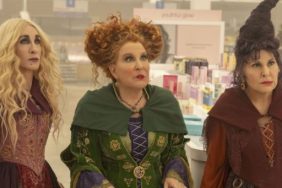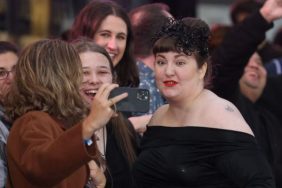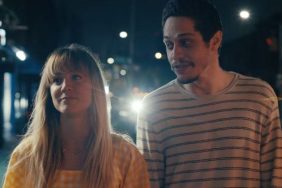Take Shelter was a major part of Jessica Chastain’s mega 2011 and the movie that really put Michael Shannon in front of major eyeballs. It was not writer/director Jeff Nichols’ first film. That was 2007’s Shotgun Stories, also starring Shannon. His third film, Mud, premiered at last year’s Cannes Film Festival, and played Sundance and SXSW this year. Mud is the name of a fugitive played by Matthew McConaughey, hiding out in the woods where Ellis (Tye Sheridan) and Neckbone (Jacob Lofland) meet him and try to help him get his girlfriend (Reese Witherspoon) back. Nichols came to L.A. just days before the film opens on Friday so we got to have a conversation in the bar of the Four Seasons hotel in Beverly Hills. We talked about Shelter, Mud and he gave me some helpful advice for this year’s Cannes Film Festival.
CraveOnline: Take Shelter had quite a journey from when it premiered at Sundance through the awards circuit after it came out. How did you develop your next film?
Jeff Nichols: I already had it written. I wrote Take Shelter and Mud in the same summer, summer of 2008. Both were ready to go in terms of where they were at the script stage. So as we were finishing Take Shelter, as soon as it premiered at Sundance, my producer, Sarah Green, who was the executive producer on Take Shelter, was already off to the races on Mud. In fact she had already been starting to help me with it, so she’s a producer of such a high caliber that I was able to be out with Take Shelter and Mud in its infancy was starting to get things put together on it. She was finding out numbers, budgets and everything else. Usually I was having to do that on my other two films. I had this support system all of a sudden. And then there was this fall, between playing at Cannes in Critics’ Week and its release in the fall, there was all of that summer. That summer is when we put it into overdrive in terms of getting it cast and getting it into production.
Your first film didn’t go quite that far. What was the leap from Shotgun Stories to Take Shelter?
A long time, a lot of knocking on doors and asking people to make my movie. Shotgun Stories did well critically. It was on some best of lists but it didn’t break through the way Take Shelter did. So it was a challenge just getting anybody to buy in. They knew about Shotgun Stories, a lot of people did, and heard they should respect it or whatever. That didn’t mean they were willing to gamble on me making a movie, so I just had to find the right people to get the ball rolling. Also a big part of that was I had to drop the budget down. Take Shelter when I originally wrote it, I was like yeah, this’ll probably be a $2-3 million movie. That just wasn’t happening so I just made a decision to figure out how I could make it for under a million bucks and that’s when things changed. That’s when the wheels on the bus started to move a little bit.
What would the extra $2 million have gotten you for Take Shelter?
The exact same thing. We just would’ve paid everybody better and had a little bit more time.
You got Michael Shannon before he exploded. Did you call it?
Yeah, I called it. I’ll take credit for that. I saw him when I was back in college. A friend of mine who was a professor at school had been at the Sundance labs and worked with him and showed me a videotape of him and I was just like, “That guy. I want that guy in every movie I’ll ever make.” I wrote Shotgun Stories for him. That was back in 2004 when we were making Shotgun Stories. So I don’t know, I’m not a rocket scientist. I don’t have some crazy insight. It’s very apparent to watch Mike Shannon and know that he’s talented, so I just took advantage of that.
I’ve got to ask, have you talked to Reese Witherspoon since her incident this week?
I mean, I saw her at the premiere and I gave her a hug but we didn’t talk about that. She wished me the best of luck and that was it.
When was your premiere?
Sunday night in New York.
Oh wow. I actually didn’t recognize her in this movie. How did you develop the look with her?
She actually had a lot to do with that. On the page, it’s written she’s obviously a fallen angel to a bit of a degree. She had tattoos on her hands, she smoked cigarettes. She was kind of sexy and trashy all at the same time so that was in the script, but she had a lot to do with the style of makeup she used, hair extensions, everything else. The one breakthrough that I remember was a few weeks before we were starting to shoot, she got hit by a car. Do you remember this? She was out jogging and got hit by a car and we were terrified for her initially, and then terrified that we wouldn’t get to start the movie. She was in our first week.
She had a big cut on her forehead, a big bruise on her face and eye, a black eye and she sent me a photograph. She was like, “I think we can cover it with makeup. I’m going to be okay.” I remember seeing her with bruises and thinking, “That’s a perfect look for this character” because I was trying to figure out a way, she’s so striking and so good looking, it’s like okay, how do we break that up a little bit? I was thinking about putting a tattoo on her neck or something and that just seemed cliché and cheesy. I just thought just a bruise on her face would do it so we gave her a black eye. By the time we were shooting, hers had already started to heal so we were actually adding a black eye.
Ellis’s dad was refreshingly honest with him. Was that important to you to show parents being sometimes brutally honest with their children?
I guess. I don’t know. My parents were always pretty straight shooters with me. They didn’t talk down to me very much. The thing about that character though is he’s so wrapped up in the problem with his wife and the separation that they’re going through that he can’t do what a parent should do which is put their kids first. One of my favorite scenes of his is he’s asking how he got the black eye and he says, “Oh, my girlfriend.” “Oh, you have a girlfriend?” This nice conversation about a father talking with his son about his first girlfriend, and all of a sudden he mentions the girl’s name has two first names, the dad’s like, “Oh, that’s like your mother.” Then all of a sudden the scene turns into this conversation about his mother and it gets venomous because of the place that the dad is. So I just saw the dad as a person who was so hung up on his own problems at the time, which are severe. It’s reasonable to think he’d be hung up on them, that he couldn’t see the forest for the trees. He certainly couldn’t put what was happening with his son ahead of his own problems.
Ellis, of course, doesn’t understand that a kiss doesn’t make someone your girlfriend. Do you think his father would have caught that and protected him from that if he’d been present?
Oh, I don’t know. Maybe, but during the course of this story, his dad’s in a damaged state and his dad would’ve given him the wrong advice. His dad gives him the wrong advice almost through the whole movie.
Is that something we all have to learn on our own anyway?
I would say that, yeah. Well, you have to experience it on your own. Nobody can feel it for you, and it’s a feeling. First love is a feeling. Your first heartbreak is a feeling, and getting over it is a feeling. Someone can tell you what it felt like but you have to experience it for yourself to get through that cycle.
Are you a romantic?
I think so. I’m a weird combo. I’m Ellis and I’m Neckbone all at the same time because I call bullsh*t on a lot of things and I also like the idea of believing in things. So it depends on the situation. I’m a little bit of both of those guys.
Did you get Joe Don Baker out of retirement for this?
I don’t know if he was in retirement. I remember asking the question, like how’s his health? I asked and the agent responded “fit as a fiddle” or something. He was great. He showed up, did his day and it was lovely to talk to him. He talked about Buford Pusser and everything else.
Was Take Shelter meant to be ambiguous, or were you confirming one interpretation in the end?
It’s meant to be ambiguous, yeah. That movie’s ending isn’t about what happens next. It’s about what came before. That’s a different kind of ending. A lot of endings are about what happens next, and even if they’re ambiguous or not, it’s about what happens next. What happens next doesn’t matter in that movie. It’s about what came before.
I guess it’s funny that I might have thought it confirmed something, and only talking with other people realized it wasn’t either answer.
I’m on a certain side of that fence. I know what I think happened but it’s really cool. It’s a real gift to make a movie that is open to that kind of debate. Some people hate it. You have to be willing to accept those criticisms, which I am, but I don’t know, it doesn’t happen very often.
Is that going to be your Pulp Fiction briefcase that you’ll never tell?
Yeah, I think so. I think so. I think it has to be, because otherwise then I’ve just undone this magical thing that I stepped into.
I’m going to Cannes for my first time this year. Can you give me any tips for the festival?
Yeah, first off, congratulations because you’re going to the center of the universe as far as film goes. I truly believe that. I don’t know, just do it all. Do it all. Go out every night. Do it all. How long will you be there? 10 days? A week?
I was thinking 10 days but should I do the whole two weeks?
If you didn’t, you would have missed this film, and you would have missed Drive the year before, so think about that. But also, it’s rad, man. It feels like it’s regal and vicious and immediate all at the same time. Just get ready. Sleep up. Rest up and just do it all. Wake up and go to the movies and then stay out all night.
I already think Sundance and the Austin fests are amazing. I imagine Cannes is going to be a different kind of amazing.
I hear, I’ve never been there from y’all’s perspective, but I hear it’s easier to navigate in a way, to get into films and other things. I don’t know if that’s true or not.
Cannes is easier?
Cannes.
I guess I know my way around Sundance. I can get into most things.
Right, you would be the exception to that rule.
I’m probably starting on the lowest rung at Cannes since it’s my first time.
I don’t know. Just enjoy it. Enjoy the movies. And this isn’t advice, this is a warning. Knives come out in Cannes for you critics. Just give ‘em some thought. Give ‘em some thought because everybody’s rushing to judge and everybody’s rushing to be the first review up so that somebody will click on their website.
That I’ve actually learned from previous festival experience. I have some festival reviews I regret because I thought about them more later. I wish I could review the afterlife of a film.
And I’ll say this. I’ll say this, and you’re in that business, you have to do that. I get it. I get it that you need to go write your review in 30 minutes and put it up online. I get that. But, Thierry Fremaux is a very intelligent man and he’s thought about these films and he’s thought about this program. I guarantee you there’s more to think about. I guarantee you. That doesn’t mean your first instinct won’t be right, but those films are there for a reason. I really believe that, and I’m not just talking about my film. He’s thought about those films. Someone else thought about those films for people. It’s worth going beyond your initial gut reaction.
I think my editor will back you up on that and give me a little more time.
That’d be great. That’s be great. Good luck with it. It’s going to be a good time. Do you have a tux?
No, I don’t own a tux.
I guess for the press screenings you don’t have to be in one but if you can go to the Palais for a true blue screening, it’s what watching a movie is supposed to be like. Everybody’s dressed up and it feels like you’re paying tribute to the process of moviemaking. Not even just the film, just the process of watching the movie. I imagine you love movies like I do. That’s what it is.
Maybe this is the reason to buy a tux that I’ll own forever.
Do it. My mom bought me one from Dillard’s for my first trip and I had that tux forever.
Will you always be a writer/director?
I don’t know. I don’t know. I think I’ll always write and I’ll always direct, so yes, I will always be a writer/director. Whether I exclusively only direct what I write, that’s a different question.
We’ll see if you get offered a script someone else writes.
I’ve been offered a few. If it’s the right one and it’s a story that I can understand and wrap my head around, definitely.
Do you have a writing schedule you follow?
I used to. I have a son now. I used to write at night. I used to love to write at night and when I’m on a strict deadline I do have to start writing at night because nobody bugs you. When you’re writing, you look for any excuse to not write. Checking your e-mail and everything, so at night nobody’s sending you any e-mails, nobody’s calling you so I really like writing at night. Now I’ve had to get more into a 9 to 5 schedule for writing and it doesn’t work as well.
What were you doing between 2007 and 2011?
Writing and working. I was working at an ad agency in Austin just trying to make money and keep my head above water. I sold an idea to HBO for a TV pilot that I wrote that they didn’t pick up. I wrote one script for hire, did a rewrite on a script for hire that didn’t work.
That movie didn’t get made?
It hasn’t been made yet and I think they’ve hired another person to rewrite what I wrote so I don’t think they really know what kind of movie they want to make out of it, and I certainly, unfortunately, didn’t help them. But I got paid for it. And I just lived my life.
Where did you go to college?
North Carolina School of the Arts. I was there with, older than me, but my cinematographer Adam [Stone] who shot all three of my films. David Gordon Green was there three years ahead of me. Craig Zobel, It was a good place. Conducive to southern storytelling and the actual mechanics of it. It was great.
Filmmakers today are starting to give the advice: Don’t waste money on film school. Just make your film. I appreciate the advice of that but did you find value in the education?
I needed it. I found value in meeting all these people. They’re all my crew. They’re my creative collaborators and that’s worth paying for. And the bonus is, then they show you the lingo and everything else because yeah, sure, don’t go to film school, okay, that’s fine. Go make your movie, that’s fine too, but then if your movie’s good, then you’re going to be stepping up into more of a mechanism that’s reflected of how typical movies are made and it helps to have that knowledge. But whatever, there are a million ways to skin a cat.
Fred Topel is a staff writer at CraveOnline and the man behind Shelf Space Weekly. Follow him on Twitter at @FredTopel.






